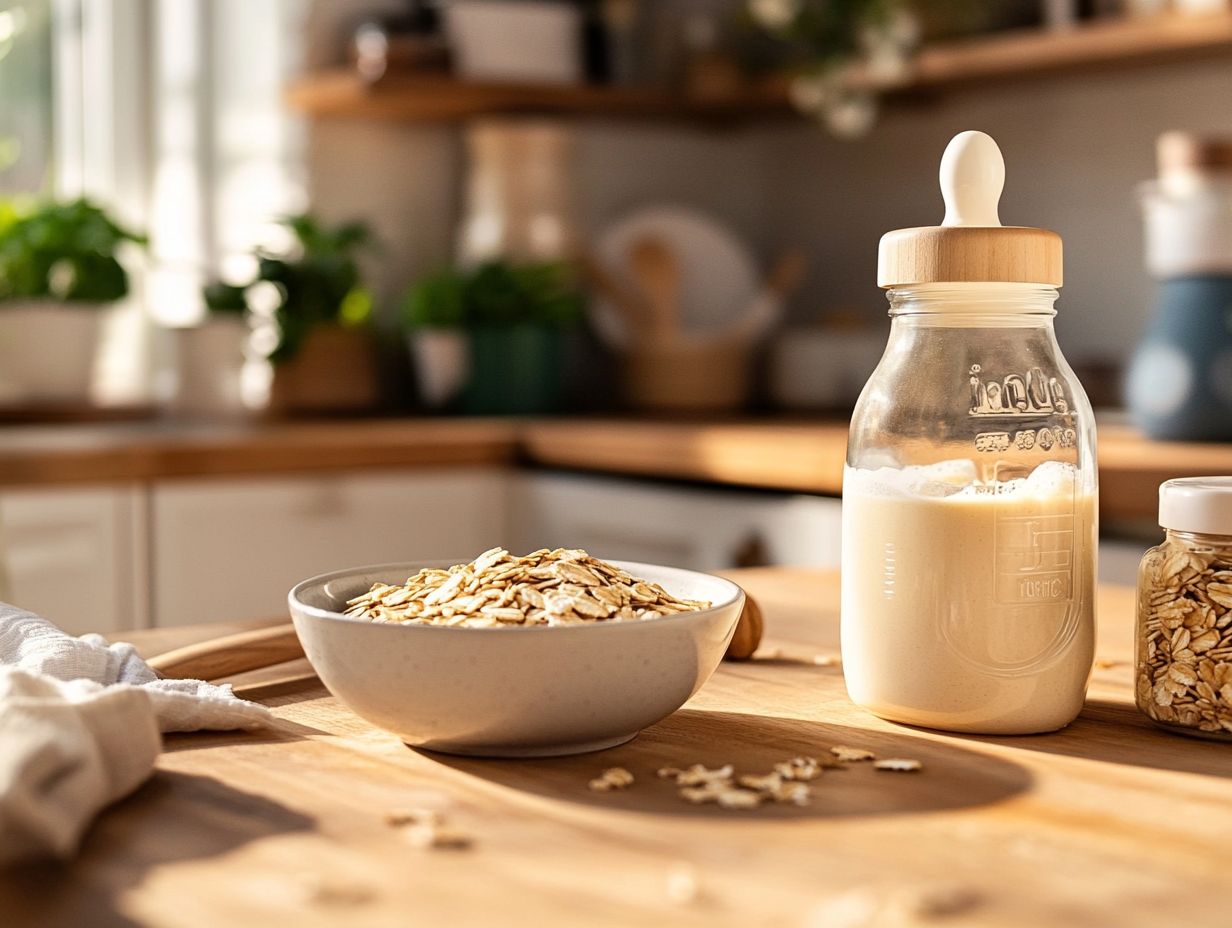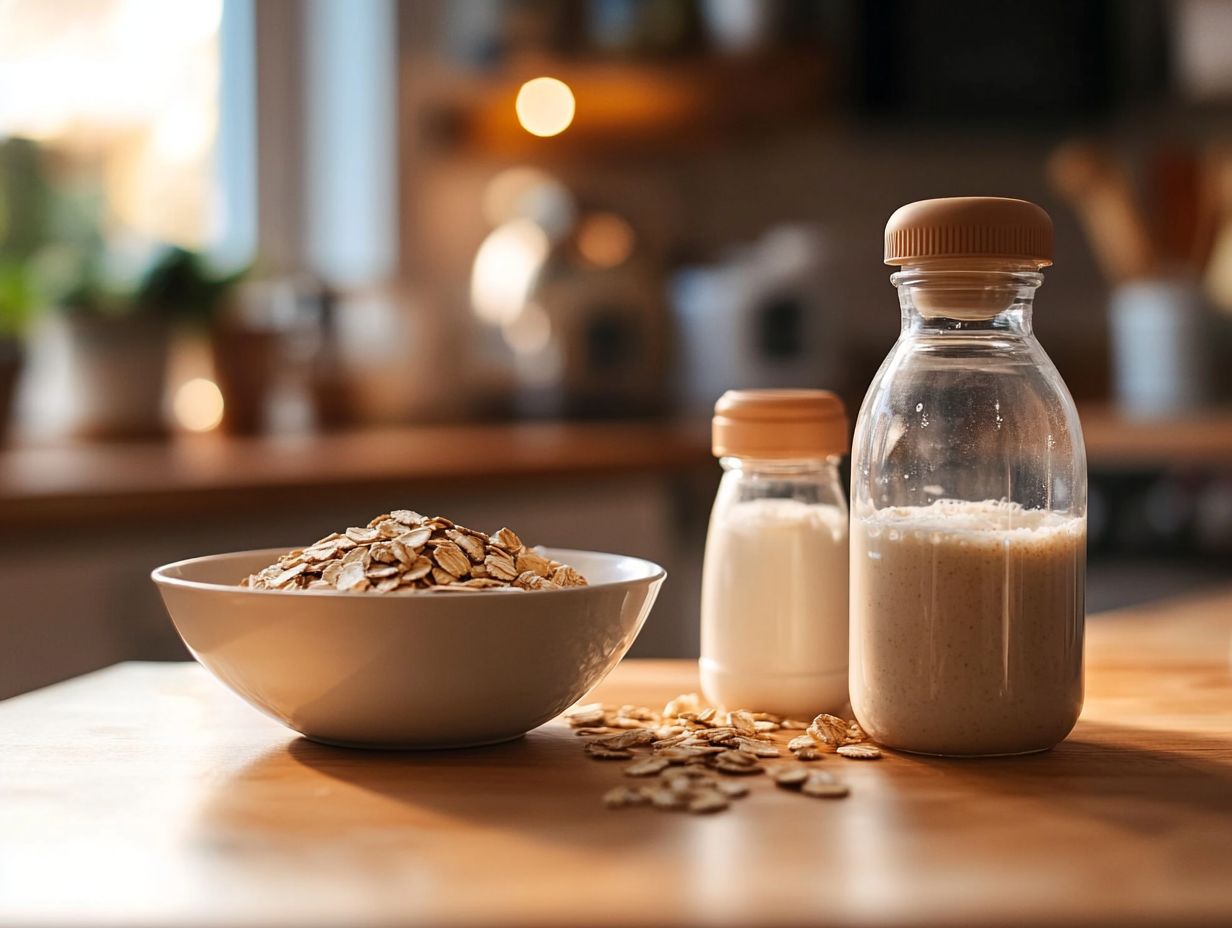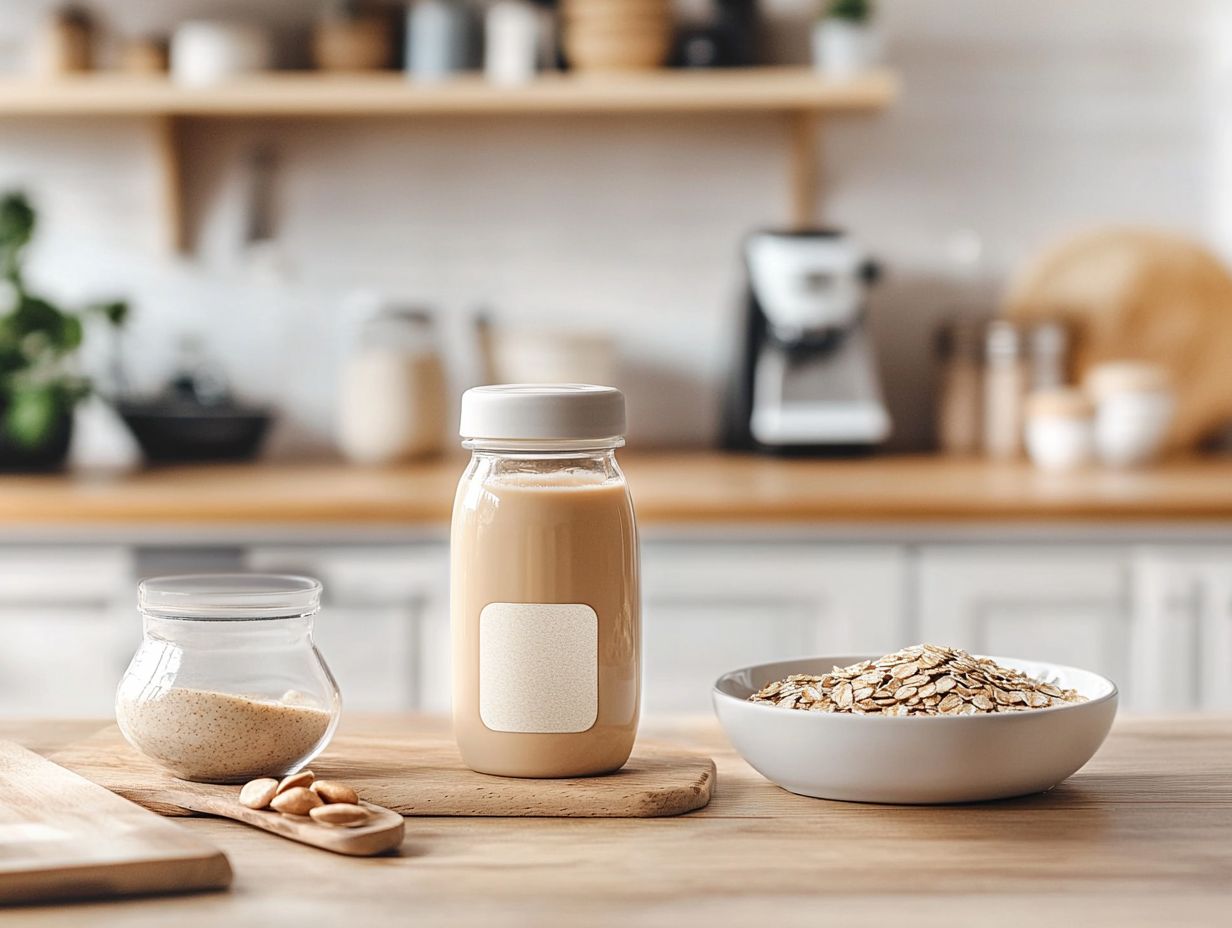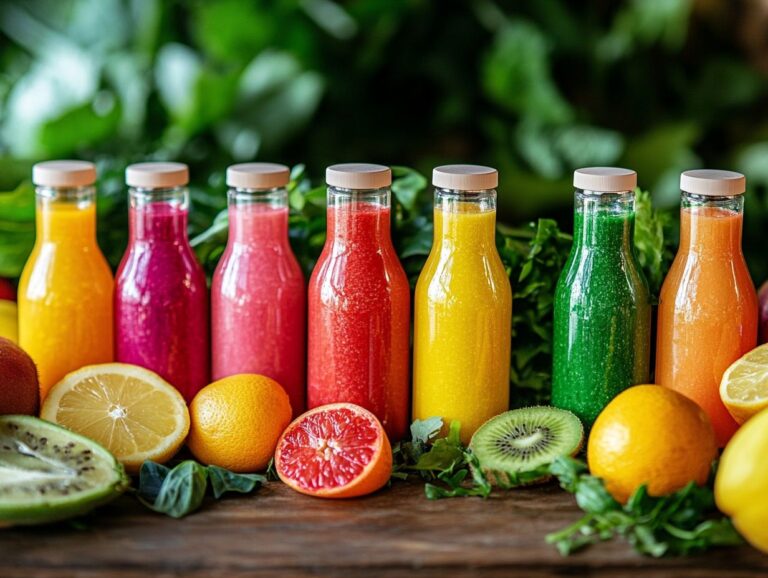Non-dairy infant formula has gained popularity as more parents seek alternatives to traditional dairy-based formulas. This type of formula is specifically designed for babies with dairy allergies or lactose intolerance, as well as for those following vegan or vegetarian lifestyles. In this discussion, we will explore what non-dairy infant formula is, the various types available, and the benefits it offers. Additionally, we will provide guidance on how to choose and prepare the right formula for your baby, along with an overview of any potential risks involved.
What Is Non-Dairy Infant Formula?

Non-dairy infant formula serves as an alternative to traditional formulas, specifically designed for babies who cannot consume cow’s milk or dairy-based products due to allergies, sensitivities, or dietary preferences. These formulas are essential for vegan parents or those seeking alternatives to cow’s milk for their infants.
Non-dairy infant formulas ensure that all babies, including those with milk protein intolerance or cow’s milk allergies, receive adequate nutrition to support their growth and development. These formulas utilize plant-based protein sources and organic whole-food ingredients to meet the specific nutritional needs of infants while promoting comfort and safety.
Why Choose Non-Dairy Infant Formula?
Non-dairy infant formula is important because it offers a healthy alternative for babies whose parents choose to avoid dairy for medical, personal, or ethical reasons, particularly those with lactose intolerance or cow’s milk protein allergies.
This type of formula helps prevent digestive issues, allergic reactions, failure to thrive, and other health concerns associated with cow’s milk. It also provides parents with peace of mind, knowing they are taking appropriate measures for their infant’s health and comfort.
Non-dairy infant formulas are designed to meet the nutritional requirements of babies, whether addressing specific medical needs or catering to those whose parents follow a vegan lifestyle, ensuring balanced nutrition essential for their growth and immune development.
1. Allergen-Free
One of the primary benefits of non-dairy infant formula is that it is allergen-free, making it a safe option for infants with cow’s milk allergy (CMA) or related allergies. Many non-dairy infant formulas are hypoallergenic, which minimizes the risk of allergic reactions while providing essential nutrition without the symptoms associated with milk allergy.
For parents concerned about potential allergic reactions in their infants, these specially formulated products offer reassurance. These formulas often use hydrolyzed proteins, which break down milk proteins into smaller, more digestible molecules, significantly reducing the likelihood of adverse reactions.
Some non-dairy infant formulas utilize rice, soy, or pea protein instead of dairy to meet the dietary needs of infants allergic to cow’s milk, soy, or other potential allergens. This careful formulation addresses common baby allergies and accommodates the needs of infants with allergies beyond dairy, allowing parents to provide necessary nutrition while alleviating concerns about allergic reactions.
2. Suitable for Lactose-Intolerant Babies
Non-dairy infant formulas are ideal for lactose-intolerant babies because they do not contain lactose, a common cause of digestive discomfort. Babies with lactose sensitivity may experience reflux, gas, and bloating when consuming traditional cow’s milk, making non-dairy options a necessary addition to their diet.
These formulas ensure that babies receive adequate nutrition while avoiding the adverse reactions associated with lactose consumption. By choosing lactose-free alternatives, caregivers can provide a more pleasant feeding experience for their babies, all while delivering essential nutrients needed for healthy growth and development.
Symptoms of lactose intolerance can manifest within minutes of feeding, causing distress for both the baby and the parents. Non-dairy formulas that contain proteins and healthy fats help alleviate these uncomfortable symptoms and promote proper digestion.
This approach to infant nutrition significantly enhances the overall well-being of lactose-sensitive babies.
3. Vegan and Vegetarian-Friendly
Non-dairy infant formulas are an excellent choice for vegan and vegetarian parents who wish to provide their babies with a diet that aligns with their ethical values. Typically plant-based and free of animal-derived ingredients, these formulas are designed to meet the nutritional needs of vegan infants.
By offering a nutritionally adequate diet for growth and development, non-dairy infant formulas take ethical considerations into account. The growing popularity of plant-based diets is particularly evident among parents who are concerned about the environmental impact and animal cruelty associated with dairy products.
Research conducted by the Research Institute of Child Nutrition in Dortmund, Germany, and the University of Giessen indicates that protein intake from soy and pea protein-based non-dairy formulas is comparable to that from cow milk protein formulas, along with similar growth and health indicators.
Common alternatives used in non-dairy formulas include:
- soy
- almond
- oats
These provide essential proteins, vitamins, and minerals necessary for healthy infant growth. This ensures that even within a vegan lifestyle, there is no compromise on the nutritional milestones that must be achieved during these crucial early years.
What Are the Different Types of Non-Dairy Infant Formula?

The most common types of non-dairy infant formula include soy-based formulas, which are often used for their protein content and serve as a dairy alternative for lactose-intolerant babies.
Hypoallergenic formulas are designed to reduce the likelihood of allergic reactions, making them suitable for infants with sensitivities.
Additionally, goat milk formulas are becoming increasingly popular as a closer alternative to cow’s milk for some babies.
Understanding the differences between these various infant formula types can help parents select the best formula brand for their infants.
1. Soy-Based Formula
Soy-based formulas are the second most popular type of non-dairy infant formula. As a plant-based protein source, these formulas offer a good supply of protein along with other essential nutrients, serving as a substitute for breast milk or cow’s milk in a child’s diet. They are primarily used for infants with lactose intolerance or those with a cow’s milk allergy.
Nutritionally designed to meet the full requirements of infants, soy-based formulas provide comparable nutrition to other types of formula and are a rich source of protein. Additionally, they are fortified with vital micronutrients such as calcium and iron, making them a suitable choice for parents concerned about their infant’s nutritional needs.
These formulas support healthy development in infants and are particularly optimal for families following a vegan lifestyle, ensuring that babies receive proper nutrition without using animal products.
However, there are potential health concerns associated with soy, such as phytoestrogens and their impact on hormone levels. Therefore, parents should consult with their pediatrician to determine the best feeding options for their infants that align with their personal dietary preferences.
2. Hypoallergenic Formula
Hypoallergenic formulas are designed for infants who exhibit intolerance to milk protein or have a severe allergy to cow’s milk and other dairy products.
These formulas utilize hydrolysis to break down protein molecules to a degree that minimizes allergic reactions, ensuring that babies receive essential nutrients without triggering adverse immune responses.
For parents dealing with baby allergies, hypoallergenic formulas offer a safe feeding option that meets the nutritional needs of infants who might otherwise react negatively to dairy.
Additionally, hypoallergenic formulas can help alleviate discomfort associated with allergies and support healthy growth and development during crucial early stages of growth.
3. Goat Milk Formula
Goat milk formula is increasingly being recognized as a suitable option for children who cannot drink cow’s milk-based formula and who may benefit from an alternative to traditional dairy formulas, although it is not strictly dairy-free since it contains animal protein.
Many parents report that their children experience fewer digestive issues, such as reflux, when consuming goat milk formula, which has different attributes compared to cow’s milk. The nutritional profile of goat milk formula caters to various needs, making it popular among parents seeking gentle feeding solutions.
It boasts higher levels of certain nutrients, including calcium and vitamin A. Additionally, goat milk contains smaller fat globules that are easier to digest, reducing the likelihood of constipation or discomfort.
Often, goat milk formula is fortified with prebiotics to support gut health, making it a highly favorable option for sensitive stomachs.
How to Choose the Right Non-Dairy Infant Formula for Your Baby?
Selecting the best non-dairy infant formula for your baby is a crucial task that requires careful consideration of various factors, including the baby’s specific dietary needs, allergies, and sensitivities.
Parents should explore the different formula options available and assess which one is most suitable for their baby’s health and nutritional requirements.
Consulting with a pediatrician can offer valuable guidance in making the optimal choice for the baby’s health and growth, especially when considering baby formula options, including non-dairy and dairy-free baby formula.
1. Consider Your Baby’s Allergies and Sensitivities

When selecting a non-dairy infant formula, such as those suitable for vegan babies or those with cows milk allergy, it is essential to consider the baby’s allergies and sensitivities. This ensures that the chosen formula provides the necessary nutrients without posing an uncomfortable or potentially dangerous feeding experience.
Babies with milk protein intolerance, which may indicate a dairy allergy or sensitivity, should be fed specialized formulas, such as lactose-free or hypoallergenic formulas, designed to alleviate these issues. Understanding the specific allergens involved is crucial in finding the appropriate non-dairy option, such as plant-based or soy-based formula.
Hypoallergenic formulas that are partially or extensively hydrolyzed—meaning the protein is broken down into smaller, less allergenic portions—can be beneficial. Additionally, labels indicating that the formula is free from allergens, such as hydrolyzed baby formula or amino acid formula, may offer extra reassurance.
Nevertheless, the best non-dairy formula for a particular baby, considering options like hydrolyzed rice protein or plant-based protein, should be determined in consultation with a pediatrician.
2. Consult with Your Pediatrician
Pediatricians are a vital resource for parents seeking non-dairy infant formulas, such as dairy-free baby formula, for their babies. With their medical expertise and familiarity with your child’s medical history, pediatricians can provide tailored medical advice specific to your child’s needs.
They assist parents in identifying allergens and sensitivities while recommending the best available infant formulas on the market. By taking into account specific health factors such as lactose intolerance, cow milk sensitivity, or a family history of allergies, pediatricians can suggest formulas that contain the right nutrients essential for a baby’s growth and development.
Additionally, pediatricians stay updated on the latest research and product developments, which helps parents navigate the vast array of products available. This guidance highlights specific dietary requirements and supports knowledge-based decision making based on each child’s unique needs.
Ultimately, this collaborative approach alleviates concerns and strengthens the partnership between parents and pediatricians in ensuring optimal infant nutrition.
3. Read Labels and Ingredients Carefully
Carefully reading labels and ingredients is essential when selecting a non-dairy infant formula, as it enables parents to assess the formula’s nutritional profile and safety, especially for vegan parents considering plant-based diets for their babies.
By focusing on important factors such as DHA and ARA for brain development, as well as iron content to reduce the risk of anemia, caregivers can make informed decisions that support healthy growth. Additionally, looking for organic certifications can ensure the formula meets high-quality standards.
It is crucial to avoid formulas that contain GMOs (genetically modified organisms) or artificial colors and flavors, as these can lead to unnecessary health issues. Organic whole-food ingredients are preferable to ensure the highest quality nutrition for your baby.
Additionally, understanding the various types of carbohydrates, such as maltodextrin and corn syrup, can impact a child’s digestive health. Prebiotics and probiotics added to the formula can also support healthy digestion.
Ultimately, thorough analysis of labels allows parents to select the best formula tailored to their child’s individual needs.
How to Prepare and Use Non-Dairy Infant Formula?
Ensuring the safe preparation and use of non-dairy infant formula is crucial for the health and safety of your baby.
Safe preparation involves following the specific instructions on the packaging and maintaining sanitary conditions, such as using sterile bottles and nipples, to minimize the risk of contamination and ensure formula safety.
Safe usage also includes understanding how to properly store prepared formula to maintain its nutritional integrity and prevent any digestive issues that may arise from improperly stored formula.
1. Follow Instructions on the Packaging
Following the preparation and feeding instructions for non-dairy infant formula is crucial, as each formula comes with specific guidelines that include the correct mixing ratios, water temperatures, and shelf life.
Adhering to these instructions is essential to ensure that infants receive the proper and safe nutrition they need. Proper preparation is vital because using too much or too little water can lead to malnutrition or an upset stomach for the infant.
Many formulas specify optimal temperatures for mixing, as using high temperatures can denature important proteins and vitamins. Parents should also pay attention to recommended storage practices after the formula has been prepared to prevent spoilage.
Ignoring the preparation and feeding instructions for non-dairy infant formula may expose the baby to potential malnutrition or spoilage, which can result in negative health outcomes, including stunted growth or developmental issues. Proper formula transition practices are necessary to maintain the baby’s health and comfort.
2. Sterilize Bottles and Nipples

Sterilizing bottles and nipples is a crucial step in preparing non-dairy infant formula, as it ensures the safest possible environment for your baby. Proper sterilization techniques, such as boiling or using a sterilizer, help eliminate harmful bacteria that can lead to digestive issues or infections. Ensuring formula safety during preparation provides parents with peace of mind when feeding a baby.
Ensuring formula safety during preparation provides parents with peace of mind when feeding their child. Understanding the correct sterilization methods is essential for maintaining the physical safety of infants. Ethical concerns related to formula production should also be considered by vegan parents when choosing the best product.
Techniques like steam sterilization and chemical disinfectants are employed to effectively remove pathogens, making every feeding safe. By correctly utilizing these methods, caregivers can significantly reduce the risk of contamination. Awareness of these techniques is often emphasized in nutrition conferences and by reputable baby formula brands.
Keeping formula equipment clean not only safeguards a baby’s health but also creates an environment conducive to healthy growth and development. Awareness of safe preparation practices enables parents to educate themselves on the necessary steps, reinforcing their role as guardians of their child’s safety and well-being.
3. Store Prepared Formula Properly
Proper storage of prepared non-dairy infant formula is essential for maintaining its nutritional integrity and ensuring your baby’s safety. By following these guidelines, you can help prevent discomfort and potential dangers after feeding, including digestive issues such as gas and reflux symptoms.
Storage Guidelines for Prepared Non-Dairy Infant Formula:
- Generally, prepared formula can be safely stored in the refrigerator for up to 24 hours.
- Ensure that the refrigerator temperature is at or below 4°C (39°F) to inhibit bacterial growth.
- If the formula has been warmed or left at room temperature, it should be consumed within two hours to maintain its nutritional quality and safety.
- Additionally, any unused formula that your baby did not finish should be discarded to avoid contamination risks.
By adhering to these storage practices, you can ensure that your baby receives the best and safest nutrition possible.
Are There Any Risks or Side Effects of Using Non-Dairy Infant Formula?
Non-dairy infant formulas offer various benefits; however, it is important to recognize the potential risks and side effects associated with their use. Health concerns, such as nutrient deficiencies and digestive issues, should be carefully monitored.
Parents should be aware of the possibility of nutrient deficiencies if the chosen formula fails to meet their baby’s complete nutritional needs. Additionally, some infants may experience digestive issues, such as gas or constipation, while adjusting to a new formula, which can be a significant concern for many parents.
1. Nutrient Deficiencies
Nutrient deficiencies can arise when a non-dairy infant formula lacks the essential vitamins and minerals necessary for a baby’s growth and development. Parents should ensure that the formula they choose provides balanced nutrition, including appropriate protein sources, vitamins, and minerals. Alternatives to cow’s milk, such as soy protein or other plant-based protein sources, should be considered carefully.
To identify any deficiencies early on, it is crucial to closely monitor the baby’s growth and development. Nutrients such as calcium, iron, and vitamin D are vital for healthy bones and other bodily functions, so parents should verify that these are present in sufficient quantities in the chosen formula. Consulting pediatricians or attending a nutrition conference can provide parents with the latest research and insights.
Fortified formulas can significantly address these concerns, but it is important to carefully assess the nutritional labels. Additionally, incorporating a variety of protein sources, such as legumes or meat alternatives, into a baby’s diet helps ensure that the formula provides all the essential amino acids and meets the baby’s dietary needs.
For specific recommendations and peace of mind regarding their child’s nutritional needs, parents can consult their pediatrician.
2. Digestive Issues
Digestive issues are common with non-dairy infant formulas. Infants who switch to a new non-dairy formula may experience symptoms such as gas, bloating, or reflux. These reactions can arise either from the infant’s digestive system adjusting to the new formula or due to specific ingredients that do not agree with their unique digestive system. Understanding the specific causes, such as soy proteins or certain sugars, can help in selecting the best formula for baby digestion.
It is important for parents to be aware of these potential digestive issues related to infant formulas, as this knowledge can help them mitigate and alleviate discomfort during feedings. Brands like Neocate Syneo, ProSobee, Similac, Earth’s Best, Else Nutrition, Sprout, Danone, Nutricia, Abbott Nutrition, and Holle offer various options that cater to different needs and sensitivities.
While all non-dairy infant formulas can potentially cause digestive discomfort, soy formulas and certain formulas containing specific sugars are often reported to contribute to these issues. Soy proteins and sugars such as lactose, galactooligosaccharides, and inulin may be more difficult for some infants to digest. Plant-based formulas containing hydrolyzed rice protein or fortified with prebiotics and probiotics may offer better digestive comfort.
Parents can monitor their child’s susceptibility to these difficulties by observing any changes in fussiness or feeding ability when using these types of formulas. Vegan diets for babies might require more attention to ensure all nutritional needs are met through formula options available on the market.
To help address these reactions, it may be beneficial for parents to maintain a food diary to track which formulas or ingredients lead to discomfort. Additionally, a pediatrician can provide alternatives for feeding and suggest ways to improve the baby’s digestion, ensuring that the infant remains healthy and comfortable during this crucial period of growth. Formula brands like Bebe M and Prémiriz also offer specialized options to cater to specific health concerns and dietary requirements.
3. Possible Contamination
Contamination poses a serious risk for non-dairy infant formula, such as lactose-free and hypoallergenic formula, as improper handling or storage can introduce bacteria that may lead to illness in babies. To minimize these risks and ensure a safe feeding experience, vegan parents should adhere to strict guidelines for preparing baby formula. This includes sterilizing feeding equipment and properly storing prepared formula.
Plus sterilizing bottles and utensils, it is important for parents to wash their hands with soap and water for at least 20 seconds before each feeding to reduce the presence of germs. Parents should also pay attention to the expiration date on the formula packaging and avoid using any leftovers from a feeding session, as bacteria can multiply in unused formula, which is a significant health concern. Additionally, choosing formula options with organic certifications can support a baby’s health.
It is recommended to keep prepared non-dairy infant formula, such as soy-based formula or those with plant-based protein, in the refrigerator and consume it within 24 hours. This practice is crucial for maintaining formula safety and ensuring the infant’s nutritional needs are met.
By following these best practices, parents can not only help maintain their infant’s health and address any cow’s milk allergy or milk protein intolerance, but also alleviate anxiety, knowing they are providing a safe feeding environment. Considering alternatives to cow’s milk-based formulas can offer benefits for babies with digestive issues or cow milk sensitivity.





